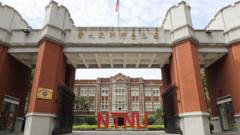In a statement made on Saturday, Chou expressed regret for her actions, acknowledging the distress caused to the students due to her pressure. She stated, "It is definitely my fault for making you feel the way you did." The examination highlights that students were subject to giving blood almost daily, with many samples improperly handled. Professor Chen Hsueh-chih, responsible for the project's oversight, also apologized, citing unintended harm to athletes and their families.
The internal assessment found discrepancies in the blood donation process and indicated allegations by Chen Pei-yu of excessive blood sample requisition—three a day for two weeks—were not entirely accurate, as the samples were later discarded. The university's principal, Wu Cheng-chi, extended his apologies, signaling a formal review of the institution's ethics and oversight policies. Furthermore, Taiwan's deputy education minister announced that the actions of both coach Chou and professor Chen would be scrutinized further.
Amidst the fallout, the education ministry hinted at potential repercussions for a separate women's football coach at NTNU regarding licensing, underlining a wider call for accountability in educational sports practices.
The internal assessment found discrepancies in the blood donation process and indicated allegations by Chen Pei-yu of excessive blood sample requisition—three a day for two weeks—were not entirely accurate, as the samples were later discarded. The university's principal, Wu Cheng-chi, extended his apologies, signaling a formal review of the institution's ethics and oversight policies. Furthermore, Taiwan's deputy education minister announced that the actions of both coach Chou and professor Chen would be scrutinized further.
Amidst the fallout, the education ministry hinted at potential repercussions for a separate women's football coach at NTNU regarding licensing, underlining a wider call for accountability in educational sports practices.























